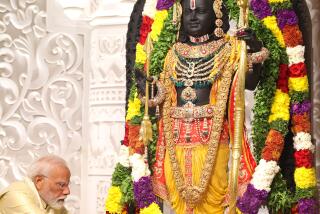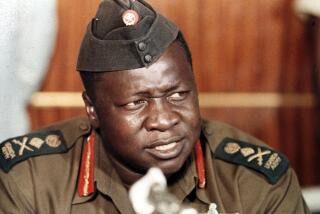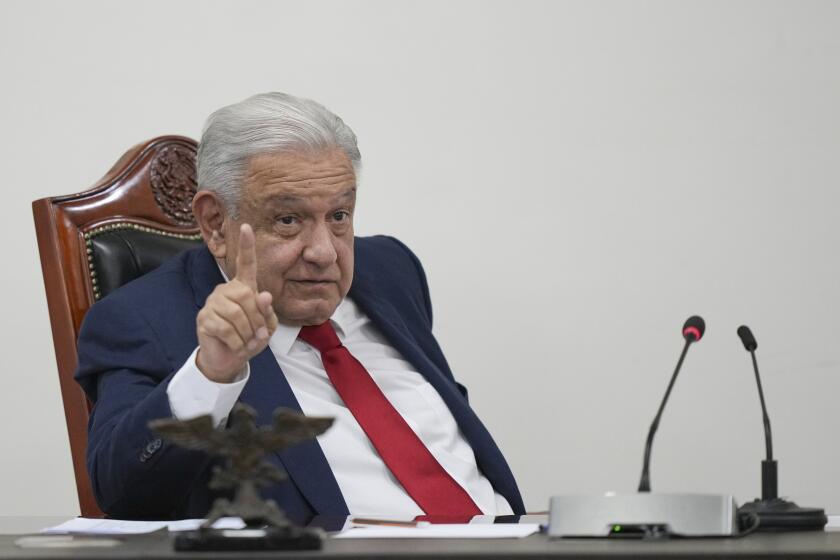Blind Libya cleric a voice of revolt
When he was a boy, the blind sheik was forced to read Moammar Kadafi’s Green Book manifesto in Braille, his fingers trying to decipher the erratic mind of a leader who brutalized a nation.
“It was nonsense, the work of a madman,” said Yosry Alhadar, one of the most prominent clerics in rebel-held territory in eastern Libya. “There was absolutely no value in it. He wanted the world to know that Libya is Kadafi and Kadafi is Libya. That they were indivisible. But the world is now watching the whole facade collapse.”
The sheik thought it strange that Kadafi wanted to be as loved and powerful as a god. He listened to Kadafi’s arcane and rambling speeches, following with disgust the leader’s terrorist plots and political mischief. But when the boy grew into a holy man, the government branded him an Islamic extremist and banned him from preaching.
“Kadafi didn’t want anyone to get too popular, especially a cleric,” said Alhadar, 44. “He was scared of the power of religion. He wanted no one to have a voice louder than his own. They tried to keep me from preaching for 15 years. I was arrested and interrogated.”
Kadafi, like deposed President Hosni Mubarak in Egypt, parlayed the fear of Islamic militancy into a police state to crush his enemies. An Islamic insurgency took hold here in the 1990s, but the current revolt, similar to those in Egypt, Tunisia and Yemen, has not been inspired by religion or ideology. Islamist organizations have merged with secular revolutionaries in what is a new hybrid for a region craving democracy.
Some fear, however, that if the West doesn’t act against Kadafi, religious militancy could be revived among Al Qaeda sympathizers and disgruntled young men.
“If the West doesn’t help, the young may lose their faith in democracy,” said Mustafa Gheriani, a spokesman for the rebels’ national council. “If hope is lost, it will be much easier for extremist elements outside the country to recruit them. When you are backed against the wall and have nothing else, you turn to religion.”
The sheik has become an eloquent voice of revolt. He infuses verses from the Koran with patriotism, creating a sense of epic struggle that sends young men with Kalashnikovs and grenade launchers into battle against Kadafi’s rockets and warplanes.
Dressed in bluejeans and a button-down shirt, Alhadar sat amid wooden coffins in the swept courtyard of a mosque along the North African coast. His raspy baritone echoed beyond the waves recently as he led 20,000 worshippers in prayer, urging them to be patient in the revolt to bring down Kadafi.
“My role in this revolution is to inspire people,” he said. “We know we will be victorious in the end, but we can’t rush.”
Patience against conquerors is a virtue in a country with a long history of invasions and occupations. The ancient Greeks and Romans, the Ottomans and Italians have all ruled here, leaving their cultural legacies and the fading imprints of their architecture. Kadafi, a young military officer, seized power from the monarchy in a 1969 coup, two years after Alhadar was born.
Now Kadafi’s army is on the move, and the rebel stronghold of Benghazi is in its sights.
Hundreds of caricatures of Kadafi hang in Martyrs Square in front of the courthouse; on the city’s outskirts, dozens of open graves await fallen rebels.
“God will decide when the revolution ends,” Alhadar said. “We’re just trying to speed it up. Islam gives us the strength to fight.... But there are no radicals here. All Libyans are one. We don’t have Shiite and Sunni divisions. The outside extremists can’t control us. It’s not in our culture. Our religion asks us simply to fight against injustice.”
A woman wrapped with a shawl walked along the mosque’s courtyard with a cane. Alhadar reached into his pocket and slipped her money. She praised him and said she remembered him from the old neighborhood, the blind boy, the son of a teacher, who grew into a preacher she often heard when passing the pistachio-green walls of the mosque.
She walked away, her cane clicking over the stone.
When the revolution began one month ago and young rebels jumped upon army tanks, Alhadar’s brother, an electrical worker with two children, was shot and killed by Kadafi loyalists. He wasn’t targeted. He heard gunfire and ran outside into the chaos, struck by two bullets in the street.
“I was not surprised the revolution came,” said the sheik. “But it has accelerated more than we had expected. Kadafi is finished. We will fight to the last of our blood. We have to get rid of him.”
There were not many Green Books left in Benghazi. They were collected in piles and set alight by the sea.
More to Read
Sign up for Essential California
The most important California stories and recommendations in your inbox every morning.
You may occasionally receive promotional content from the Los Angeles Times.











